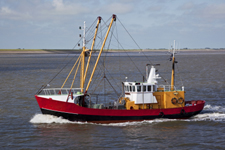Level 2 Diploma in Maritime Studies: Rivers, Inland Waterways and Limited Distances to Sea

SQA code: GG8R 60
Ofqual code: 603/4893/8
Total Qualification Time: 463
Guided Learning Hours: 419
Credit value: 46
The Level 2 Diploma in Maritime Studies: Rivers, Inland Waterways and Limited Distances to Sea will develop knowledge and skills in areas such as maritime employment, environmental and health and safety practice, survival in the water during maritime emergencies, maritime security, and emergency first aid in response to maritime accidents or medical emergencies.
The Diploma includes communication using equipment and visual means, maintaining your own work practice, vessel ropework, anchoring and mooring operations, securing a vessel for passage, vessel construction and stability, and assisting with a vessel's navigational watch. Basic vessel engineering systems, maintaining vessel machinery for safe operation, vessel repair and maintenance, and vessel navigation and tides are also covered.
Learners can specialise in vessel fire prevention and fire-fighting or maritime fire prevention and fire actions.
This qualification may be available through employers, training providers and colleges.
Use the tabs below to open each section individually. Alternatively you can show all the sections.
Rationale and purpose of this qualification
This qualification develops the skills and knowledge required by ratings, crew members or deck hands in the merchant navy, on tugs or sea-fishing vessels — whether on inland waterways, on rivers, or at limited distances to sea.
It is intended for individuals who have been certificated as competent and is aimed at those who are in work and are looking for recognition of their prior learning and experience.
Its primary purpose is to confirm the learner's occupational competence as a seafarer. As a work-related, competence-based qualification it provides confirmation to employers, industry managers that the learner has the skills and knowledge needed to meet the nationally recognised standard to carry out the role.
This qualification has been developed by the Maritime Skills Alliance (MSA).
Learners who achieve the Rivers, Inland Waterways and Limited distances to Sea Diploma can use it to gain employment, to progress in the industry, or to work towards another qualification. There is also an opportunity to advance to Boatmaster (Tier 1 level 2).
Objectives
The qualification is designed to meet the following objectives:
- preparing learners for employment
- preparing learners to progress to another qualification
- meeting relevant programmes of learning
- giving learners personal growth and engagement in learning
- supporting a role in the workplace
- confirming knowledge, understanding and skills
Recognition
The qualification has been developed in conjunction with the Merchant Navy Training Board and the Maritime and Coastguard Agency to ensure it is 'fit for purpose'.
What does this qualification cover?
As this is a competence-based qualification, learners will be acquiring the knowledge and skills required through either on-the-job experience or in a learning environment.
To gain the whole qualification, learners must complete 15 mandatory units plus one optional unit to achieve a minimum of 46 credits.
Who is this qualification for?
The Level 2 Diploma in Maritime Studies: Rivers, Inland Waterways and Limited Distances to Sea at is suitable for a wide range of learners including:
- progression learners from basic maritime qualifications
- adults returning to education
- employed learners who wish to enhance their career prospects
- unemployed learners who wish to enhance their job prospects
- learners wishing to move from one sector of the maritime industry to another
Entry
Entry to the qualification is at the discretion of the centre.
Apprenticeships
This qualification is a mandatory component in the Maritime Occupations Apprenticeship in England (as detailed in SASE).
Progression
This qualification provides the opportunity to progress to further learning or more senior positions including bosun or senior rating (either deck or engine room) on super yachts and other vessels requiring limited certification.
For those completing the Rivers, Inland Waterways and Limited distances to Sea Diploma, there is an opportunity to advance to Boatmaster (Tier 1 level 2). Learners also have the opportunity to undertake an Advanced Maritime Apprenticeship, which will apply across a range of different types of vessel controlled by international regulations, and will lead to limited certification as an officer of the watch either on the bridge or in the engine room, depending on the pathway followed.
Deliver this qualification
Thinking of working with us?
- Our 3 step approval process
- Become an SQA approved centre
- Charges and Fees of SQA Qualifications in England and Wales
Existing customer?
Where can you take this course
Qualification structure
This qualification requires the learner to complete mandatory and optional units.
SQA group award code: GG8R 60 (credit value 46)
Ofqual qualification code: 603/4893/8
The gain the Level 2 Diploma in Maritime Studies: Rivers, Inland Waterways and Limited Distances to Sea learners must complete 15 mandatory units (credit value 45) and one optional unit (minimum credit value 1). Learners may also complete any of the additional optional units, however, the credit from these does not count towards achievement of the qualification.
Please refer to the qualification structure (98 KB) for more information.